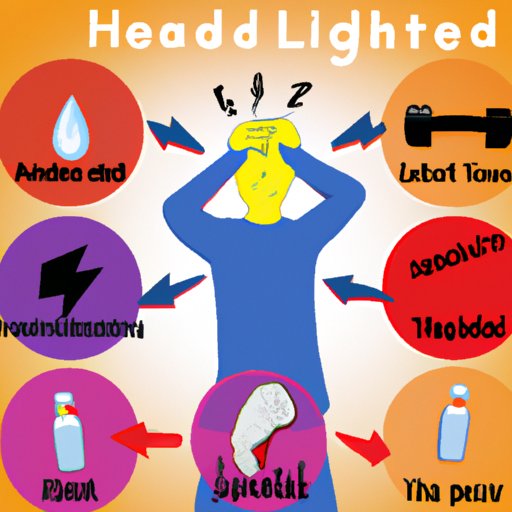Introduction
Feeling lightheaded after exercise is a common phenomenon that can be caused by a variety of physiological and psychological factors. It is important to understand the possible causes of this symptom in order to prevent it from happening and protect your health. This article will explore the potential causes of lightheadedness after exercise, as well as strategies for avoiding or reducing its occurrence.

Exploring the Physiological Reasons for Feeling Lightheaded After Exercise
One of the most common causes of feeling lightheaded after exercise is low blood sugar levels. During exercise, the body utilizes glucose (sugar) as an energy source. If the amount of glucose available is not enough to meet the demands of the activity, the body may become depleted of energy, resulting in lightheadedness.
Hypovolemia, or low blood volume, is another potential cause of lightheadedness after exercise. When the body loses more fluid than it takes in during exercise, the total volume of blood in the body decreases. This can lead to reduced circulation to the brain, resulting in dizziness and lightheadedness.
Vasovagal syncope is another possible cause of feeling lightheaded after exercise. This condition occurs when the heart rate increases too quickly or the individual stands up too quickly, resulting in a sudden drop in blood pressure. This can cause the individual to feel faint or lightheaded.

Examining the Relationship Between Intensity of Workout and Lightheadedness
The intensity of the workout can also be a contributing factor to feeling lightheaded after exercise. When exercising at a high intensity, the heart rate increases significantly, resulting in increased blood flow to the muscles and decreased blood flow to the brain. This can lead to lightheadedness or dizziness.
Dehydration can also contribute to feeling lightheaded after exercise. When the body does not have enough water, it cannot effectively transport oxygen to the cells, resulting in fatigue and lightheadedness. In addition, dehydration can cause the body to lose electrolytes, which are essential for maintaining a proper balance of fluids in the body.
The Role of Hydration in Preventing Lightheadedness After Working Out
Proper hydration is essential for preventing lightheadedness after exercise. Staying hydrated helps to ensure that the body has enough fluids to maintain blood pressure and transport oxygen to the cells. In addition, adequate hydration helps to maintain electrolyte balance and reduce the risk of dehydration.
In order to stay properly hydrated during exercise, it is important to drink plenty of fluids before, during, and after the activity. Water and sports drinks are great options for staying hydrated. It is also important to avoid drinking alcohol or caffeine, as these can contribute to dehydration.

Nutritional Deficiencies That Can Lead to Lightheadedness After Exercise
Nutritional deficiencies can also contribute to feeling lightheaded after exercise. Iron deficiency anemia, for example, can cause fatigue, dizziness, and lightheadedness due to reduced oxygen delivery to the cells. Vitamin B12 deficiency can also lead to lightheadedness due to a lack of energy production in the body.
Techniques to Avoid or Reduce Lightheadedness After Exercise
There are several techniques that can be used to avoid or reduce lightheadedness after exercise. Adjusting the intensity of the workout can help to reduce the risk of lightheadedness, as can eating a pre-exercise meal. It is also important to increase the intensity of the workout gradually, as this can help the body adjust to the increased demands.

How to Recognize the Signs of Lightheadedness During Exercise
It is important to be aware of the signs of lightheadedness during exercise, as this can help you recognize the symptoms and take action to prevent it. Common signs of lightheadedness include dizziness, nausea, and even fainting. If you experience any of these symptoms during exercise, it is important to stop and rest until they pass.
Understanding the Connection Between Stress and Lightheadedness After Exercise
Stress can also contribute to feeling lightheaded after exercise. When the body is under stress, it releases hormones such as cortisol and adrenaline, which can cause blood pressure to rise and decrease blood flow to the brain. This can result in feelings of lightheadedness or dizziness.
Reducing stress is an important part of preventing lightheadedness after exercise. Taking time to relax and practice deep breathing can help to reduce stress levels and improve overall wellbeing. Additionally, participating in regular physical activity can help to reduce stress levels and improve overall health.
Conclusion
Feeling lightheaded after exercise can be caused by a variety of physiological and psychological factors. Understanding the potential causes of this symptom can help to prevent or reduce its occurrence. Proper hydration, nutrition, stress management, and intensity adjustment can all help to reduce the risk of feeling lightheaded after exercise. Recognizing the signs of lightheadedness and taking action to prevent it is essential for maintaining good health and wellbeing.
(Note: Is this article not meeting your expectations? Do you have knowledge or insights to share? Unlock new opportunities and expand your reach by joining our authors team. Click Registration to join us and share your expertise with our readers.)
